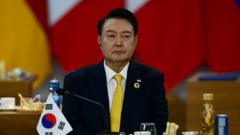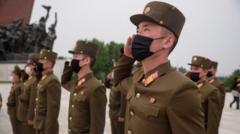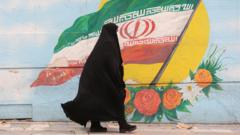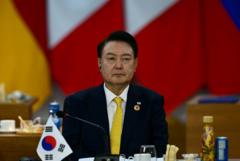South Korea's constitutional court has initiated impeachment proceedings against President Yoon Suk Yeol after his declaration of martial law led to widespread protests and calls for his resignation. With the court's decision pending within six months, political uncertainty hangs over the nation, impacting the ruling People Power Party and its leadership.
South Korea's Constitutional Court Begins Impeachment Process for President Yoon Suk Yeol

South Korea's Constitutional Court Begins Impeachment Process for President Yoon Suk Yeol
The impeachment trial of President Yoon Suk Yeol commences in South Korea following a parliamentary vote amid public protests, with potential implications for the country's leadership dynamics.
South Korea's constitutional court has officially begun the impeachment trial process for President Yoon Suk Yeol, who faced suspension after declaring martial law, an action that ignited public protests demanding his resignation. In the wake of this political upheaval, members of parliament voted to impeach Yoon, placing significant pressure on the court to reach a conclusion in a timely manner, ideally within six months.
The ruling People Power Party (PPP), of which Yoon is a member, has been involved in a tumultuous response to the impeachment vote. Following the parliamentary decision last Saturday, the PPP's leader, Han Dong-hoon, announced his resignation amid increasing calls for accountability from the pro-Yoon faction, who felt betrayed by the vote against their leader. Han's shift from supporting Yoon to endorsing impeachment was stark, indicating a fracturing alliance within the party and leaving the group's future leadership uncertain.
Public hearings related to Yoon's trial may take time, but protesters have committed to continue their demonstrations throughout the process, insisting on Yoon's removal. This sentiment echoes past instances of presidential impeachment in South Korea, where outcomes have varied, with one case being overturned and another upheld.
The court's ability to proceed with only six justices is noteworthy, as three judges have recently retired. Regardless, the court plans to hold a preliminary hearing on December 27. If Yoon's impeachment is upheld, South Korea will be required to conduct fresh presidential elections within two months. In the meantime, Prime Minister Han Duck-soo has taken on the role of acting president.
There remains uncertainty about whether Yoon will testify in court; he has previously defied summons from prosecutors, which raises the possibility of law enforcement intervention if he continues to refuse. Yoon has maintained that his actions during the crisis were justified and has expressed a determination to fight the impeachment charge.
The ongoing situation presents a complex landscape for South Korea's political environment, with potential ramifications for the future of the PPP and its leadership. As the trial unfolds, the nation remains on edge, awaiting the court's verdict and the next chapter in its political narrative.



















